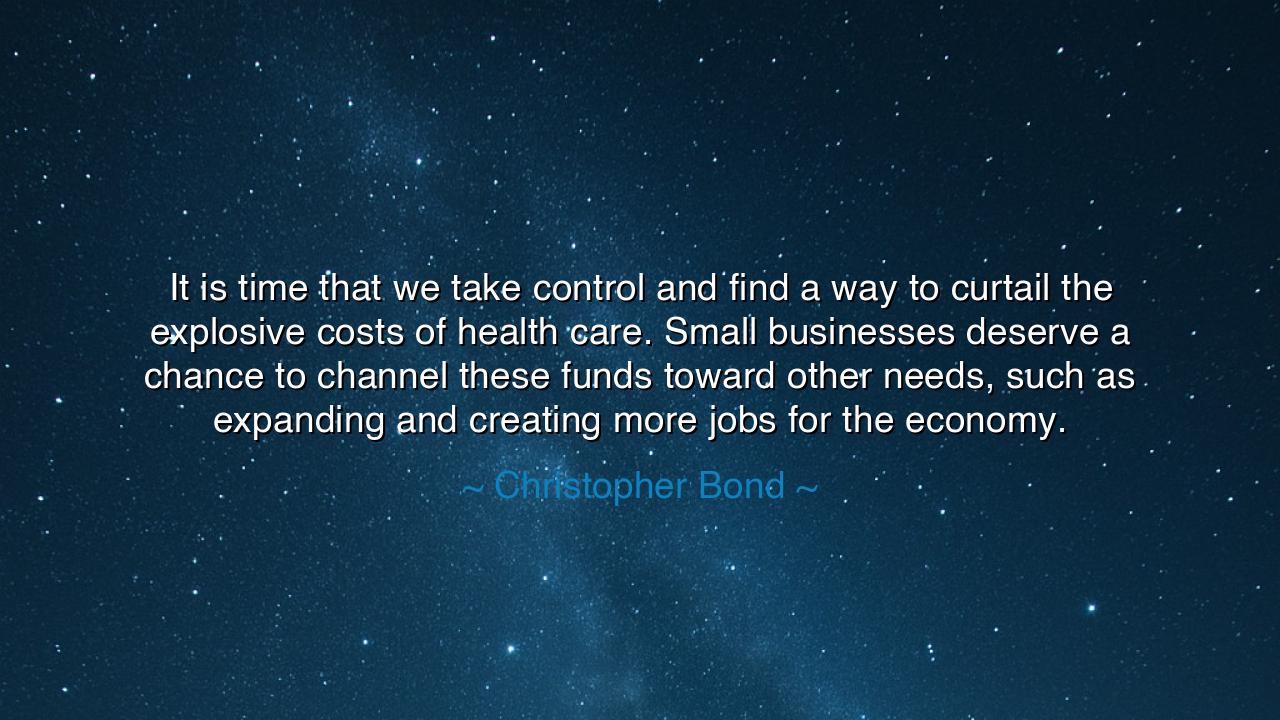
It is time that we take control and find a way to curtail the
It is time that we take control and find a way to curtail the explosive costs of health care. Small businesses deserve a chance to channel these funds toward other needs, such as expanding and creating more jobs for the economy.






The words of Christopher Bond—“It is time that we take control and find a way to curtail the explosive costs of health care. Small businesses deserve a chance to channel these funds toward other needs, such as expanding and creating more jobs for the economy.”—ring like a clarion call for balance, justice, and stewardship. Beneath the language of policy lies a timeless truth about responsibility and sustainability—that a society which allows essential needs to spiral beyond reach endangers not only its wealth but its soul. His words echo the ancient wisdom that when the burden of survival grows too heavy, the vitality of the people begins to fade, and with it, the strength of the nation itself.
For centuries, civilizations have wrestled with the same dilemma: how to care for the health of their people while nurturing the vigor of their economy. Bond’s call to “take control” speaks to the ancient virtue of moderation—that sacred equilibrium between compassion and discipline, generosity and prudence. The “explosive costs of health care” he warns against are not merely numbers in ledgers; they are symbols of imbalance, of a system that consumes more than it gives. When the healing of the body becomes the sickness of the nation, wise leaders must act, not with cruelty, but with clarity—to restore order, fairness, and sustainability.
To understand the spirit of his words, one must look not only at the modern marketplace but back to the stories of old. In the city of Athens, during the time of Pericles, the state took pride in supporting its citizens through public health and civic welfare. Yet even in that golden age, when the costs of such generosity began to outweigh the means to sustain it, the city faltered. Temples stood tall, but treasuries ran dry. The philosophers warned that a society that spends beyond its wisdom, even in noble causes, invites ruin. And so Bond’s words are not merely about economics—they are about preservation, about ensuring that what we build today does not collapse beneath the weight of our unchecked desires tomorrow.
His message also honors the heartbeat of the nation: small businesses. For these are not mere enterprises—they are the lifeblood of community, the forges where courage and innovation are tempered. When such builders are shackled by excessive costs, their growth is stifled; their dreams, postponed. Bond envisions a world where these entrepreneurs may “channel their funds toward other needs”, where resources now consumed by inefficiency might instead give rise to opportunity—new shops, new inventions, new livelihoods. This vision is as ancient as it is modern, echoing the old agrarian wisdom: tend the roots, and the branches will flourish.
There is also in his words a deeper moral echo—the call for collective responsibility. To “take control” is not to abandon compassion, but to discipline it; not to hoard, but to steward. It reminds us that compassion without structure can lead to waste, and structure without compassion can lead to cruelty. The wise ruler, like the just physician, knows that the cure must not destroy the patient. So too must society seek remedies that heal without impoverishing, that strengthen without suffocating. The true art of governance, like the art of medicine, lies in achieving harmony between care and cost.
Consider the story of Florence Nightingale, who during the Crimean War revolutionized not only nursing but the management of health resources. She did not simply tend to the wounded; she reformed the way care was organized—tracking costs, reducing waste, improving outcomes. Her work proved that efficiency is not the enemy of compassion but its ally. In her balance of heart and intellect, we see the very spirit of Bond’s appeal: to create systems where healing and prudence walk hand in hand.
Thus, the lesson we inherit from this quote is one of wisdom through stewardship. We must never allow compassion to become chaos, nor thrift to become neglect. A thriving nation must ensure that its resources—financial, human, and moral—are directed toward growth, empowerment, and the common good. When health care becomes affordable, when small businesses thrive, when communities can both heal and prosper, then the promise of civilization is renewed.
And so, my children, remember this truth: every age must learn to govern its compassion wisely. The strength of a people lies not only in their generosity but in their discipline, not only in their dreams but in their designs. Take control of what you can, balance heart with reason, and build systems that serve life rather than consume it. For only when we master the art of sustainable care will we achieve the ancient ideal—a society both healthy and free, compassionate yet enduring, prosperous yet just.






AAdministratorAdministrator
Welcome, honored guests. Please leave a comment, we will respond soon